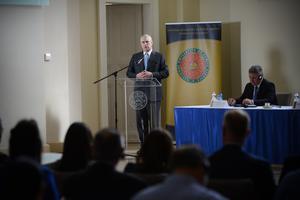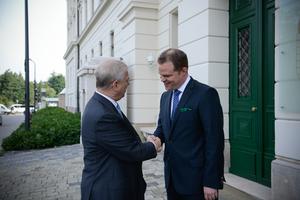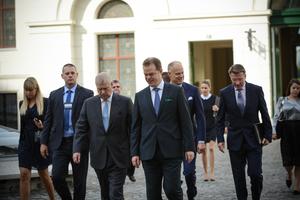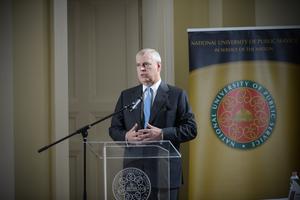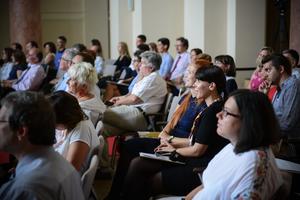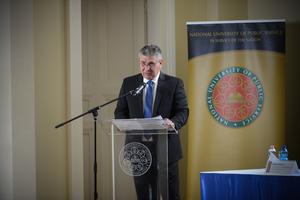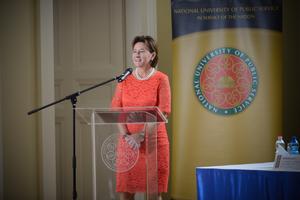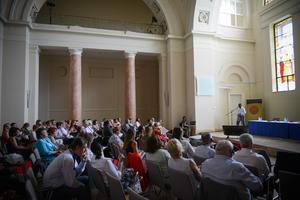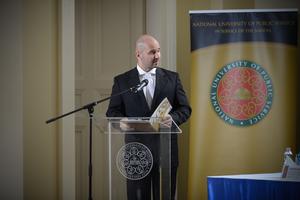“Both the United Kingdom and Hungary have a significant history in professional and public administration. We have experienced that with the involvement of communities into the dialogue, we can achieve better results in public administration and the communities will feel empowered” - said His Royal Highness the Duke of York, Prince Andrew at the National University of Public Service’s workshop.
At the event, the question of social values and responsibility as well as its policy aspect were put to the focus of discussions, where they presented the British and Hungarian practices. In his opening speech, HRH The Duke of York talked about Brexit as well. He highlighted that the status of the United Kingdom will change in the following years, however the country will remain open to strengthen the bilateral relations with its European neighbours. The workshop is an example of this concept: the Duke of York highlighted that similar workshops are excellent opportunities for exchanging experiences, sharing information, ideas and good practices. “A dialogue is needed in this field” - added HRH, The Duke of York. “This dialogue is equally beneficial for everyone, especially for the citizens we serve.”
Sándor Bodó, State Secretary for Labour Market and Corporate Relations, Ministry of Finance emphasized in his speech that the public service branches should operate not only as officials, but they need to overcome the bureauratic barriers in order to ensure social responsibility. The State Secretary added that both public institutions and private sector should be involved in achieving this goal. Additionally, he highlighted that the government has created an action plan that sets the direction of social responsibility: it focuses on environmental protection, employment of young persons, micro, small and medium-sized enterprises, inclusion, and family-friendly workplaces.
According to Dr. Györgyi Nyikos, in the 21st century we have to face many challenges, such as global climate change or the management of unfair social inequalities. The Vice-Rector for International Affairs of NUPS stressed the importance of finding new social and economic organisation mechanisms to solve these issues, so that synergy could evolve between the state and the economic actors. “It is not sufficient to focus only on oneself, we need to find rapport.”
Following the opening speeches, the Hungarian and British experts analysed the topic during roundtable discussions. Dr. Balázs Budai, director of the University’s Governance and State Administration Policy Institute and host of the workshop explained that the purpose of the conference was to exchange experiences and mindset with the aim of integrating the British practices into the Social Responsibility in Public Administration project.
Guy Battle, Chief executive of Social Value Portal presented the example of the United Kingdom where the public procurement system was complemented by social responsibility. They have created a framework in which taking social responsibility is an advantage in the evaluation of applications in public procurement. The expert further explained that the society will get back 20% of each euros spent, in other words, 20 cents. He highlighted that “the Social Value Act aims to create a stronger and more cohesive community”.
Dr. William Jabanga, Head of Corporate Procurement at Royal Borough of Greenwich explained that, following the financial crisis, there was a growing need for a dynamic appearance of the public service branches and for an execution of new public service activities, however the assigned budget did not increase compared to the extended responsibilities of local authorities. As a consequence, the public service branches have been outsourcing more and more activities, hence the role of public procurement has been reevaluated. “Without efficient policies, it is not possible to achieve the goals with public procurement only” - said the expert. He also stressed that the basis of this policy are the social values that contribute positively to the life of the community. According to him the representation of social values does not have any additional cost.
Mátyás Gáspár, the leading expert of the researches conducted at NUPS put the emphasis on public sector research (PSR) and he presented the research programs in the area of social responsibility. “The public interest and public service do not guarantee automatically the social responsibility” - said the honorary associate professor, adding that social responsibility matters should be complemented by accountability. He also said that the public social responsibility is present in the national public administration, such as in the practices of the Hungarian Competition Authority, the Hungarian National Bank or the Municipality of Budaörs. He further noted that this level of public responsibility appears at different levels and degrees, development trends reinforce the necessity of the topic, social responsibility is moving towards cross-sectoral globalization. At the ed of his presentation, the expert highlighted that government and local governments will become key players in social responsibility processes, thus it has become timely to raise and institutionalise the PSR to a strategic level.
